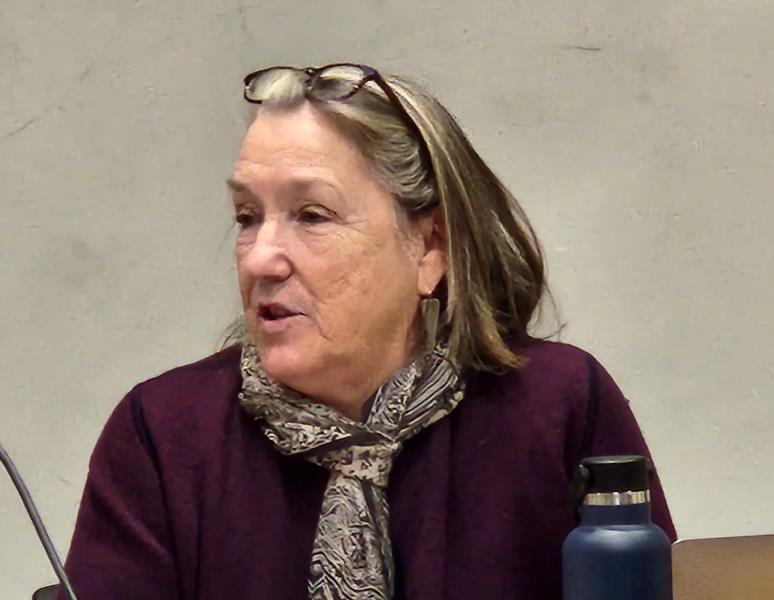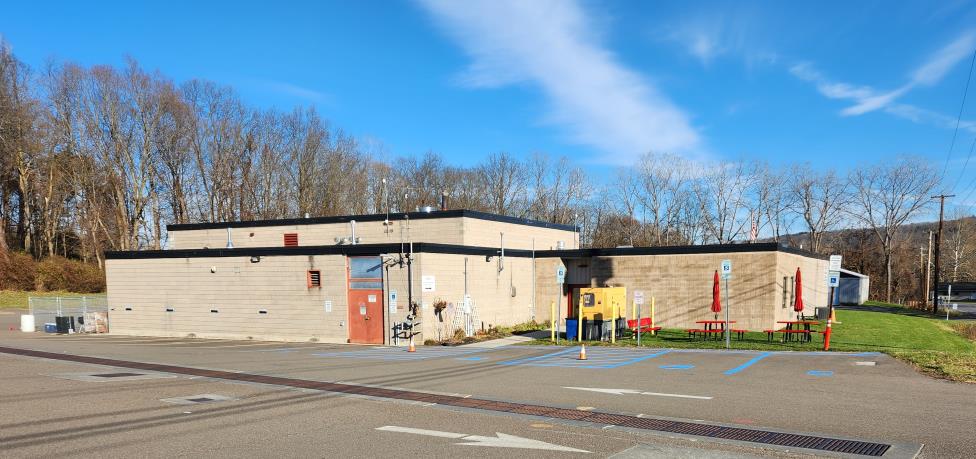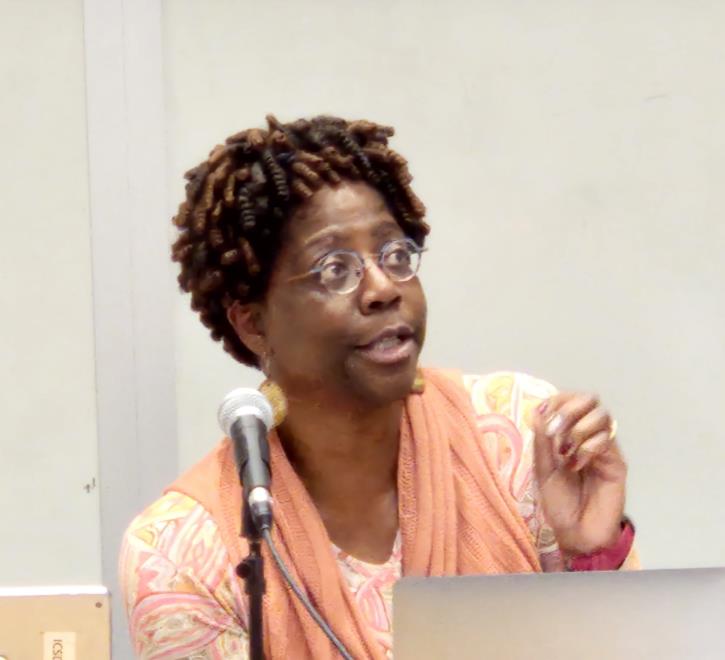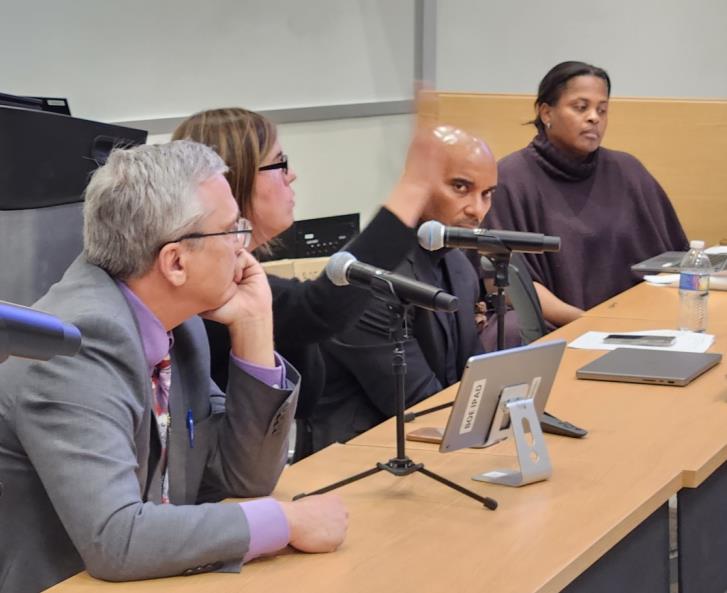by Robert Lynch; November 30, 2023
They probably could have voted last Tuesday night. They didn’t. For one thing, two of Ithaca’s nine School Board members, including its President, could not attend. For another, perhaps more important reason, several on the Board want more time to mull options. Yet one common thread emerged from the Ithaca Board of Education’s 30-minute November 28th discussion of a proposed capital spending initiative sprung upon the community with fairly short notice: the current School District Transportation Facility at the foot of Bostwick Road now lives its life on borrowed time.

“The environment in which we have our people working in is just unconscionable,” Eldred Harris told fellow Board members at the meeting as he appraised the current bus garage’s condition. “We raised the salary, but that’s not the only thing that keeps employees tethered to a position,” Harris added, acknowledging Ithaca’s ongoing problem of hiring and keeping school bus drivers. “It’s also the work environment.”
The Ithaca School District Transportation Facility was built in 1967. Two of three options presented a pair of School Board committees November 16th would replace the bus garage completely. The third, least expensive option, would keep the existing Bostwick Road facility, but retrofit it for an electrified bus fleet, mandated by New York State to be universal in just 12 years. The retrofit alone could cost $15 Million. A new garage coupled with the upgrades would cost $40 Million.
But the third option presented the committees—one favored Tuesday by Harris and tantalizing several other Board members—would invest much more, as much as $125 Million in total. The larger package would include the garage, but also a catch-all list of still loosely-defined and likely-to-change districtwide projects ranging from roof replacements to parking lot paving to something called “visioning.”
Board members Tuesday remained split between a go-big option and taking capital spending in smaller bites. But the bus garage replacement brought no opposition.
“I do feel strongly that we need a new bus garage,” member Jill Tripp said, she among those who would place capital spending before voters in smaller increments.
“Having a current garage that’s only capable of maintaining two buses at a time is ridiculous in a fleet of 88,” Harris asserted. He also said that other undersized, outdated aspects of the 56-year old facility make working there “insanity.”

The transportation facility’s replacement first came to the public’s attention at the Board’s previous voting meeting November 14th. (See earlier story; posted here.) It has still to receive little more than glancing media interest. And the broader capital spending choices keep changing and getting refined meeting-by-meeting. One question answered Tuesday had not previously been asked. It involves what happens to the current maintenance building should a new one be built. Will it be demolished?
“That’s the thinking,” School District Chief Operating Officer Amanda Verba answered the Board. “Because when we start to look at cost per square footage for renovation of something that is that outdated, it can be done, but I think that the cost to put you all in a new facility was a better way to go.”
With replacement of the bus garage a near foregone conclusion, expect the so-called “decision point” facing the School Board in forthcoming weeks to be how large a bite of the education apple it will ask Ithaca School District voters to take in a referendum likely to coincide with annual School District elections next May.
Jill Trip stands among those favoring the incremental approach. Providing arguably the most specific of choices discussed Tuesday, Tripp would offer a three-year bonding resolution. It would build the garage, equip it for electric buses, and then allocate an additional $10 Million for each of those next three years toward other projects; a $70 Million initiative in total.
“I think that’s more than enough for us to be handling as a major construction project over the next three years,” ”Tripp said in defense of her idea. “And then, three-to-four years from now, I would propose that we look at the next group of projects that we need to be doing, need to be looking at.”
Yet do the math. Jill Tripp’s idea may not save much money at all. The larger, $125 Million alternative would bond over a full ten years. For Tripp to spend $70 Million now, and presumably millions in each year after year three, her total request of Ithaca’s voters could arguably become much more than the current high number on the School Board’s table.
Eldred Harris led the counterargument. He’d spend now; maybe save later.
“This is very simple,” Harris said. “You can either buy a car today at 27,000, or rest assured, in three or four years that same car will be 40,000. Given the tenuous situation politically in this country or even further out, I want my grubby little hands (to) say, Get it now!”
Eldred Harris found support from the woman who sat beside him that night, Karen Yearwood.
With the $125 Million option, Yearwood said, “we’re being proactive as well as frugal with our funds and planning wisely.”

From around the School Board’s u-shaped table, Garrick Blalock echoed that sentiment.
“I just feel like we have an obligation to the voters and taxpayers to tell them all the information we have,” Blalock said near meeting’s end. “We know that our capital need is not 40 Million. We know that. So to go to voters and say authorize 40 Million when we know the need is much larger is disingenuous.”
But when it comes to the Ithaca City School District’s omnipresent, overarching, never-ceasing search for academic excellence and the District electorate’s proven willingness to spend whatever it takes to get there, business chief Verba offered what some might view as a sobering reality check.
“To think that we will come to an end of our needs is a false ideal,” Verba cautioned. “There will always be new innovations; there will always be new mandates; there will always be new laws; there will always be new requirements; and we are ever-evolving,” she reminded the Board. “Our buildings are not as quick to evolve as all of our wonderful people are.” Those people, in Verba’s assessment, “are much more agile than our buildings.”

A capital authorization, Verba reminded the Board, is just that, nothing more. It sets a ceiling on debt. According to her analysis, specific projects can wander their way through either that new funding stream or through one that might have preceded it or may follow it. For the educational visionary, the concept simplifies planning. But for the cost-conscious taxpayer, the analysis can make accountability hard.
Board Vice-President Moira Lang conducted Tuesday’s meeting in President Sean Eversley Bradwell’s absence. When Harris asked if a Board vote on capital funding was set for the next meeting, December 12th, Lang hedged. She, perhaps among others, wants time to weigh choices, though she’s steering toward the mid-ground option.
Knowing not yet which way the December winds may blow in the Ithaca High School York Lecture Hall Board meeting room, Superintendent Dr. Luvelle Brown will plan for all contingencies.
“We will prepare multiple resolutions,” Brown said. “At the first meeting in December or your second, you can choose which option you wish to direct us to.”
No doubt, bye-bye old bus garage. Hello to whatever.
###

